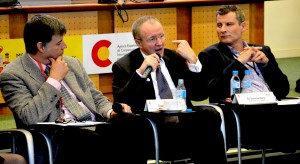November 18, 2013

Manuel Sanchez-Montero (AECID), Claus Sorensen (ECHO) and Ed Schenkenberg (DARA)
The HardTalk Series on Humanitarian Aid Effectiveness concluded with a dialogue with Claus Sørensen, Director General of Humanitarian Aid and Civil Protection Department, ECHO, November 14th.
The debate around humanitarian aid effectiveness has increased with the greater demand for value for money. Donors are putting pressure on humanitarian organisations to demonstrate results on the ground. As a result, many organisations, especially NGOs, spend more and more time on the financial and administrative requirements of their donors, which may negatively impact humanitarian programming and operations.
Does this call for greater accountability improve or take away from humanitarian effectiveness? While upward accountability has been receiving more attention, what about being accountable to the people affected by humanitarian crises?
Some of the issues compromising aid effectiveness raised were the following:
Real cost of operations: Organisations are generally reluctant to present donors with the real costs of operations out of fear that funds will be allocated to humanitarian settings that are less expensive. This malpractice hampers accountability and effectiveness – being clear on the real costs entailed is important to ensure both.
Politicisation of aid: Using humanitarianism as a tool to obtain political outcomes in conflict zones, for instance, the dismantlement of a regime, violates humanitarian principles. Humanitarianism should be used to obtain purely humanitarian outcomes, which will also guarantee presence and access to affected populations.
Race for funds: It was noted that some organisations try to outsmart others by presenting needs assessments ahead of time, exerting pressure on donors to pre-finance them. This has perverse effects and reflects a wider issue: the dysfunctionality of the humanitarian system. The survival of organisations directly depends on their capacity to raise, and thus compete for, money. This reality is counterproductive to collaboration, transparency, common needs assessments and, ultimately, aid efficiency. Furthermore, presenting needs assessments in haste usually implies that these tend to be unrealistic or exaggerated, or both. Accurate needs assessments are needed for cost-efficient action.
Administrative donor requirements: Many humanitarian organisations find themselves spending an excessive amount of time in order to respond to cumbersome donor reporting requirements, time that would be better spent delivering assistance. The system needs to find an optimal balance between administrative requirements, and operational capacity and flexibility, with sufficient space for reasonable risk. Agreeing on standardised reporting requirements among donors was discussed as a possible solution
The three-part HardTalk series has been organised by DARA and is an initiative of the Spanish Agency for International Development Cooperation (AECID). Read summaries of Humanitarian HardTalks with Valerie Amos, UN Under-Secretary General and Emergency Relief Coordinator and Peter Maurer, President of the International Committee of the Red Cross.
Event photos
[flickr-gallery mode=”photoset” photoset=”72157637696382894/” pagination=1]
Share this